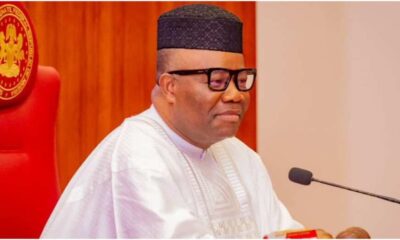The Federal Government has said a total of N5.6 trillion would be borrowed in 2021 to plug the budget deficit.
The minister of finance, budget and national planning, Mrs Ahmed Zainab, disclosed this during the virtual review of the 2021 Federal Government approved budget.
According to the minister, N2.34 trillion each would be sourced from domestic and foreign sources while N709.69 billion would be borrowed from multilateral and bilateral loan drawdowns and another N025.15 billion is expected to come from proceeds of privatisation.
While Ahmed has said the nation is gradually reducing its exposure to crude oil as only 30 percent of the 2021 budget would come from crude oil with the non-oil sector expected to provide the remaining 70 percent, experts are worried that the rising debt will continue to hurt the nation’s growth and ability to finance capital projects.
In 2020, the Federal Government said it spent N3.27 trillion on debt servicing alone while personnel cost, including pensions, gulped another N3.19 trillion.
Speaking on 2020 expenditure, Ahmed said “Of the expenditure, N3.27tn was for debt service and N3.19tn for personnel cost, including pensions.
“As at year end 2020, N1.80tn had been released for capital expenditure, that is, about 89 per cent of the provision for capital.”
Dr Muda Yusuf, the Director-General, Lagos Chamber of Commerce and Industry, who commented on the budget deficit, said the rising cost of debt servicing was a cause for worry.
Yusuf said, “We are currently dealing with a scenario where the combination of recurrent (non-debt) and debt service budgets are in excess of government revenues.
“This implies that our capital projects will be funded entirely from borrowing.
“Total projected revenue is N7.89tn; recurrent expenditure is N5.93tn; debt service is N3.12tn.
“Therefore, the combination of recurrent expenditure and debt service cannot be covered by revenue. And most often, actual revenues are less than budgeted revenues. And debt service is first line charge.
“It is thus imperative to begin to examine options for the restructuring of our fiscal operations. It is also necessary to promote reforms that will ease the burden of government expenditure and boost revenue. The oil and gas sector reform is one of such reforms.
“It is noteworthy that the Fiscal Responsibility Act stipulates that government borrowing should only be for funding of capital projects and human development. This once again brings to the fore the issue of cost of governance.
“The Act also prescribes that borrowing should be at concessionary rates and long term amortisation. One could interrogate how well current borrowing plans aligns with the provision of the Act.
“Generally, multilateral and bilateral sources are more concessionary and long term than foreign sources such as the international capital markets like the Eurobond. Multilateral and bilateral loans are often tied to specific projects, which is good.”
He added, “Until recently, domestic sources such as treasury bills and Federal Government Bonds were also very costly sources of deficit financing.
“We also need to worry about CBN financing of fiscal deficit, although, and curiously too, the budget is often silent about this.
“Strict compliance with the provisions of the Fiscal Responsibility Act and the streamlining of the cost of governance would facilitate the realisation of the fiscal sustainability objective.”

 Billionaire Watch3 weeks ago
Billionaire Watch3 weeks ago
 Startups4 weeks ago
Startups4 weeks ago
 News4 weeks ago
News4 weeks ago
 News4 weeks ago
News4 weeks ago
 Bitcoin4 weeks ago
Bitcoin4 weeks ago
 Naira4 weeks ago
Naira4 weeks ago
 Forex3 weeks ago
Forex3 weeks ago
 Treasury Bills4 weeks ago
Treasury Bills4 weeks ago



























